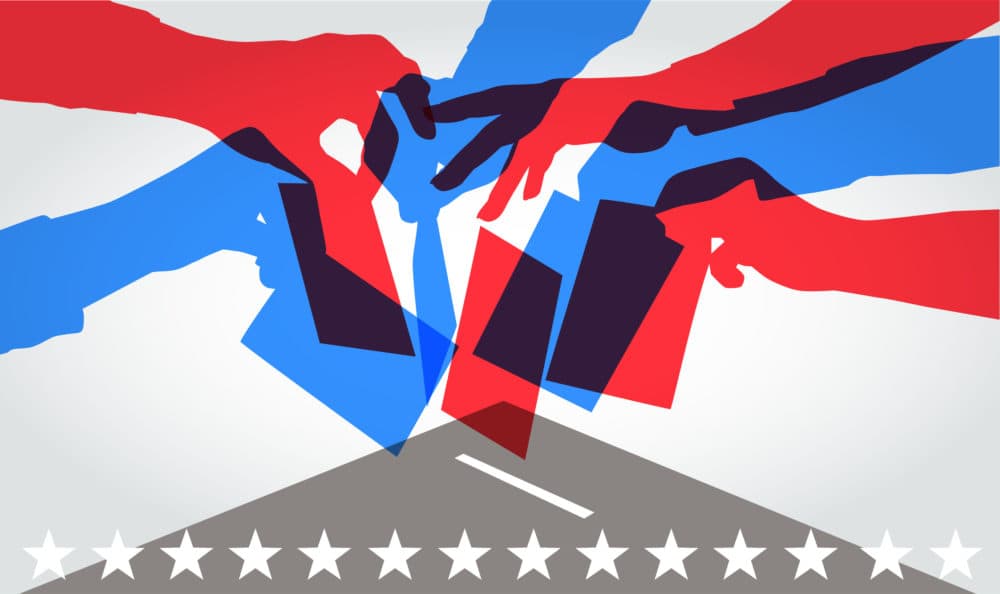Advertisement
Commentary
Why I'm still a Republican

At a party years ago in what Massachusetts residents call the “People’s Republic of Cambridge,” I mentioned to the hostess, a gay woman, that I was a Republican. “That’s fine,” she replied. “We like diversity.”
I trust she meant it tongue-in-cheek, but all the same, it gives you a small rationale for my voter affiliation: Monoliths bore me, including the Bay State’s monolithically blue electorate, where Republican numbers amount to no more than a rounding error. But it’s indisputable that the GOP’s distinctiveness has become sulfurous in many of the party faithful.
More than three-quarters of national Republicans view the ex-insurrectionist-in-chief favorably, largely because he coddled their racism or insecurities about America’s history thereof. Donald Trump stoked their conspiracy theories, from birtherism to election theft to quack medicine. The party’s congressional sellouts spent the Trump presidency genuflecting before or impotently trying to control him. He repaid the favor by siccing a maddened mob on them.
Earlier this month, I voted almost entirely Democratic, to conserve small-d democracy, currently the conservative priority. That followed my votes for the party’s last five presidential candidates. So dinner party diversity aside, why stay Republican?
After all, as iconic a conservative as Washington Post columnist George Will parachuted from the Republican plane in 2016, indicting Trump “for his comprehensive disdain for conservative essentials, including the manners and grace that should lubricate the nation’s civic life.” Yes, decent, courageous people remain in the party — Mitt Romney, Liz Cheney, some current or former governors. I’m not in lockstep with them on every issue, but only a fanatic demands that, and some will offer sane choices in the GOP presidential primary two years hence.
I’ll be voting in that contest — and remaining on the team — for reasons of politics and personality.
Politically, I prefer private solutions to problems, as opposed to the modern state’s meddling in individual decisions. Taxpayers squander hours or drain their bank accounts for tax prep each April to navigate a bewildering code, its loopholes nudging and micromanaging what should be market-based choices. (They also give the wealthy tax shelters.) Other nations universalize private health coverage; we debate the pipedream of Medicare for All and the callous chaos of Obamacare repeal. We shy away from a guaranteed income that would give poor people, rather than SNAP/Medicaid/housing vouchers/etc., agency in procuring their needs.
Republicans don’t endorse these reforms. But progressive Democrats are, if anything, even more allergic. The party of the New Deal fetishizes bureaucratic complexity as the prerequisite of social justice. It missed the memo from musician Bono, who grasped through activism, confirmed by data, that “the off-ramp out of extreme poverty is … entrepreneurial capitalism.”
[S]uccessful malcontents have prevailed in both parties by staying and reforming, not leaving and wrecking.
Still, one area where I favor more government — abortion restrictions — would cancel my invitation to any card-carrying Democrat’s Thanksgiving.
And let’s be honest: Who’d want to be in a stalled elevator with the terminally smug among progressives? Not Bernie Sanders. (“What I’m afraid the Democrats have not always done in the past … is treat people with respect. … The intellectual elite does have, in some cases, a contempt for the people who live in rural America.”). Or Barack Obama. (“This idea of purity and you’re never compromised and you’re always politically woke and all that stuff, you should get over that quickly.”)
I could register as an independent, a la George Will. But this is where personality becomes relevant. I’m ornery enough to reject RINO (“Republican in name only”)-fixated thugs deciding who fits inside the Republican tent. Leaving, should it come to that, will be my choosing — not theirs.
Two great philosophers remind us that party commitment can’t be unconditional. Sean Connery took his last turn as James Bond after vowing never to reprise the role; the in-joke title of his 007 curtain call was Never Say Never Again. Edmund Burke affirmed that “a state without the means of some change is without the means of its conservation.” That goes for parties as well.
If developments prove that Republicans’ raison d'être has curdled permanently into hate — of immigrants, the libs, democracy, reality — then following Will’s independent path will be morally mandatory. The fate of Trump’s just-announced presidential candidacy will be one barometer.
Yet here’s cold fact: The GOP’s birth in the 1850s marked the last phoenix of a major new party rising in this country. Since then, successful malcontents have prevailed in both parties by staying and reforming, not leaving and wrecking.
William Jennings Bryan purged Gilded Age Democrats of their pro-business proclivities to become the party of the little person. (Others had to rinse the party of its sympathies for slavery and Jim Crow later.) Dwight Eisenhower reconciled Republicans to the New Deal, while insisting on fiscal responsibility in erecting federal guardrails around the economy.
Today’s plutocracy-friendly, deficit-running, authoritarian GOP needs similar transformations. Democracy needs a responsible conservative party. History suggests that a Republican reboot, rather than a replacement, is likelier.
